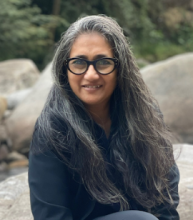India generates over 160,000 tonnes of solid waste daily, yet rural areas remain overlooked in waste management discourse, infrastructure, and policy. In this talk, Rosalind explores the complex, often invisible realities of rural waste—where rising plastic pollution meets fragmented governance, caste-based labor, and absent systems. Unlike urban spaces, rural waste is rarely prioritized. Development schemes bypass it, departmental plans are fragmented, and the Solid Waste Management Rules (2016) are poorly enforced. Infrastructure, where it exists, often serves to check boxes rather than create lasting solutions. Drawing from work across 17 villages in Raigad, Maharashtra, this talk highlights the lived labor of rural women and the informal systems communities build in the absence of state support. Waste, here, is not just a logistical problem—it is social, political, and ecological. This session urges students, researchers, and policymakers to rethink rural waste through a lens of equity, dignity, and structural accountability.

Rosalind Pereira is the founder of Project Aamhi, a community-driven rural waste management initiative based in Raigad, Maharashtra. Her work focuses on building decentralized systems for waste segregation, recovery, and reuse—while creating dignified livelihoods for rural women, who are too often the invisible backbone of environmental labor. Project Aamhi currently operates in 17 villages, extracting plastic waste from public spaces, facilitating segregation at source, and connecting local recyclers with community-level sorting efforts. Through partnerships with panchayats, SHGs, and local businesses, the initiative nurtures circular economies and behavioral change from the ground up. It also promotes upcycling through the creation of functional, aesthetic products made from marine and industrial waste.





